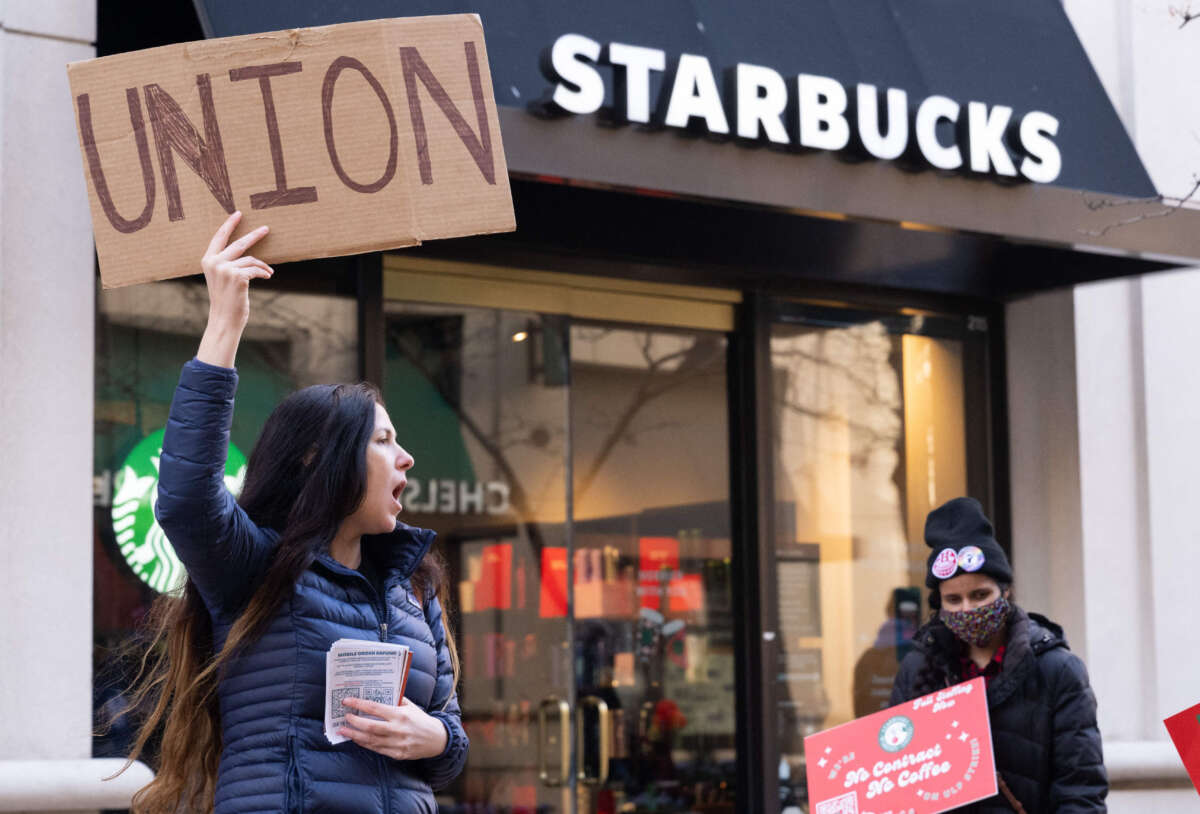Support justice-driven, accurate and transparent news — make a quick donation to Truthout today!
Starbucks Workers United announced on Tuesday that it has reached a “significant” agreement with the company to take steps toward negotiating first contracts for unionized stores after union members say Starbucks has worked to obstruct and delay contract negotiations for over two years now.
According to a seemingly joint statement released by both parties, the union and the company have agreed on a “foundational framework” that will guide coming talks for collective bargaining agreements.
To put weight behind the pledge, the company — which has carried out a fierce campaign to oppose the union and labor law at large — announced that it is allowing unionized stores to access credit card tipping and other benefits that the company excluded them from in 2022. Late last year, a judge had ruled that Starbucks had withheld those benefits illegally in order to discourage union organizing and discriminate against unionized workers.
Details of the framework are currently scant, though Bloomberg and The American Prospect have reported that it includes an agreement by Starbucks to bargain a universal contract that would apply to all unionized locations. This is something that the company has previously opposed in seeming attempts to further stall contract negotiations and expend union time and resources despite locations across the country having sought unionization for similar reasons, like cuts in hours, understaffing and low pay.
The union has hailed the agreement as a significant milestone after years of fighting for a first contract.
“A giant step forward made possible by thousands and thousands of us joining together and speaking out,” the union wrote in an announcement on social media. “THIS IS HUGE.”
Indeed, union members and experts have said that the agreement could amount to a major breakthrough for Starbucks workers and for the U.S. labor movement.
“It still feels pretty surreal right now,” said Michelle Eisen, a barista at the first location to unionize, in Buffalo, and a prominent organizer in the union, to The New York Times. “There has not been a single call I’ve been on today where either I wasn’t crying or everyone else wasn’t crying.”
Starbucks workers’ movement played a large role in inspiring a wave of retail union drives, and concrete wins in a first contract could show workers elsewhere what they could win with an organizing campaign.
“They moved a company that to a lot of people — and I will put myself at times in this category — seemed to be immovable,” Sharon Block, executive director of the Center for Labor and a Just Economy at Harvard Law School, told Bloomberg. “If this kind of campaign results in moving a company like Starbucks, I think a lot of workers are going to say, ‘You know what, I think we can move my company, too.’”
In their statements, the union and company explained that the agreement came about as the union and the company were in the process of discussing ongoing intellectual property litigation, potentially referring to the company’s lawsuit against the union for a statement the union released in October affirming its support for Palestinian rights.
“While there is plenty of work ahead, coming together to develop this framework is a significant step forward and a clear demonstration of a shared commitment to working collaboratively and with mutual respect,” the groups wrote.
The announcement comes after Starbucks sent a letter to the union in December expressing a desire to resume contract talks, which have largely stalled in recent months. The letter was met with much skepticism from labor advocates, who said that the move amounted to PR, citing the company’s sinking stock value that has resulted from its anti-union campaign and boycotts by advocates for Palestinian rights over the company’s intellectual property lawsuit.
The union and labor activists have been upping the pressure on the company in recent weeks. Last week, students, faculty and staff at 25 university campuses waged protests and organizing campaigns urging their universities to cancel their contracts and licensing agreements with Starbucks because of its fierce anti-union campaign. Student activists at Cornell University had successfully pushed their university to cut ties with the company last year over its anti-union campaign.
Trump is silencing political dissent. We appeal for your support.
Progressive nonprofits are the latest target caught in Trump’s crosshairs. With the aim of eliminating political opposition, Trump and his sycophants are working to curb government funding, constrain private foundations, and even cut tax-exempt status from organizations he dislikes.
We’re concerned, because Truthout is not immune to such bad-faith attacks.
We can only resist Trump’s attacks by cultivating a strong base of support. The right-wing mediasphere is funded comfortably by billionaire owners and venture capitalist philanthropists. At Truthout, we have you.
Truthout has launched a fundraiser to raise $41,000 in the next 7 days. Please take a meaningful action in the fight against authoritarianism: make a one-time or monthly donation to Truthout. If you have the means, please dig deep.
